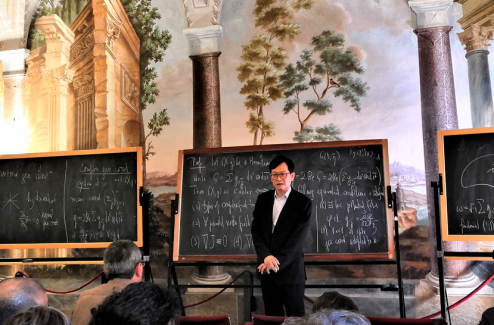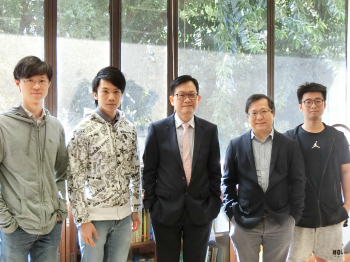研究故事
VP(R)'s Picks: Mathematician at the Frontier of Knowledge
上一頁
分享
相關連結
Theoretical mathematics pushes the limits of human knowledge by probing patterns in the world around us. HKU’s Chair of Mathematics, Professor Ngaiming Mok, is renowned for his achievements in this pursuit.
After the ancient Greek mathematician, Archimedes, made the first significant approximation of pi (π or 3.14159……) by fractions in the 3rd century BC, it took humans another 2,000 years – until the 18th century – to demonstrate that pi is itself not a fraction. The persistence and curiosity that drove that type of discovery continue to be hallmarks of the world’s best mathematicians, including the Edmund and Peggy Tse Professor in Mathematics and Chair of Mathematics, Professor Ngaiming Mok.
Professor Mok was named a Fellow of the American Mathematical Society in 2019, a Fellow of the Hong Kong Academy of Sciences in 2017 and a Member of the Chinese Academy of Sciences in 2015. Recently, he co-authored a landmark article with Jonathan Pila of Oxford University and Jacob Tsimerman of the University of Toronto, that represents a breakthrough in the field of functional transcendence theory, a subject inspired by the study of transcendental numbers – of which pi is one.
The scholars combined model theory, logic and geometry to solve a problem related to the Ax-Schanuel Conjecture formulated in the 1970s. The results were published in the flagship journal Annals of Mathematics and serve as an example of Professor Mok’s efforts in bringing different fields of mathematics together in order to find solutions to outstanding problems.
“If you give the mathematical community a topic, they will try to find the underlying mechanism that makes it work, without the need for a priori applications, although applications will eventually result,” he said. “The point is to test human intelligence by trying to deal with questions whose solutions are much beyond what you imagine. These solutions can bring in ideas that may look very foreign to the problem.”
In this case, his expertise in geometry brought a novel twist to what is essentially a problem in number theory by helping the team to visualise their problem. Professor Mok specialises in complex differential geometry, several complex variables and algebraic geometry.
Despite having no immediate applications, the knowledge created by pure mathematicians such as Professor Mok underpins many discoveries – even centuries after it is uncovered.
“You could say that GPS [global positioning system] is an application of Euclidian geometry, which originated with the ancient Greeks,” he said. “But I do not spend time applying geometry to develop GPS. I’m interested rather in testing the limits of human intelligence through mathematical research.”
Apart from being nominated to learned societies, Professor Mok’s research and global perspective on Pure Mathematics have brought him international honours, such as the Presidential Young Investigator Award of the United States in 1985, the State Natural Science Award of China in 2007 and the Bergman Prize of the American Mathematical Society in 2009.

Professor Ngaiming Mok (centre) and his HKU research team members




